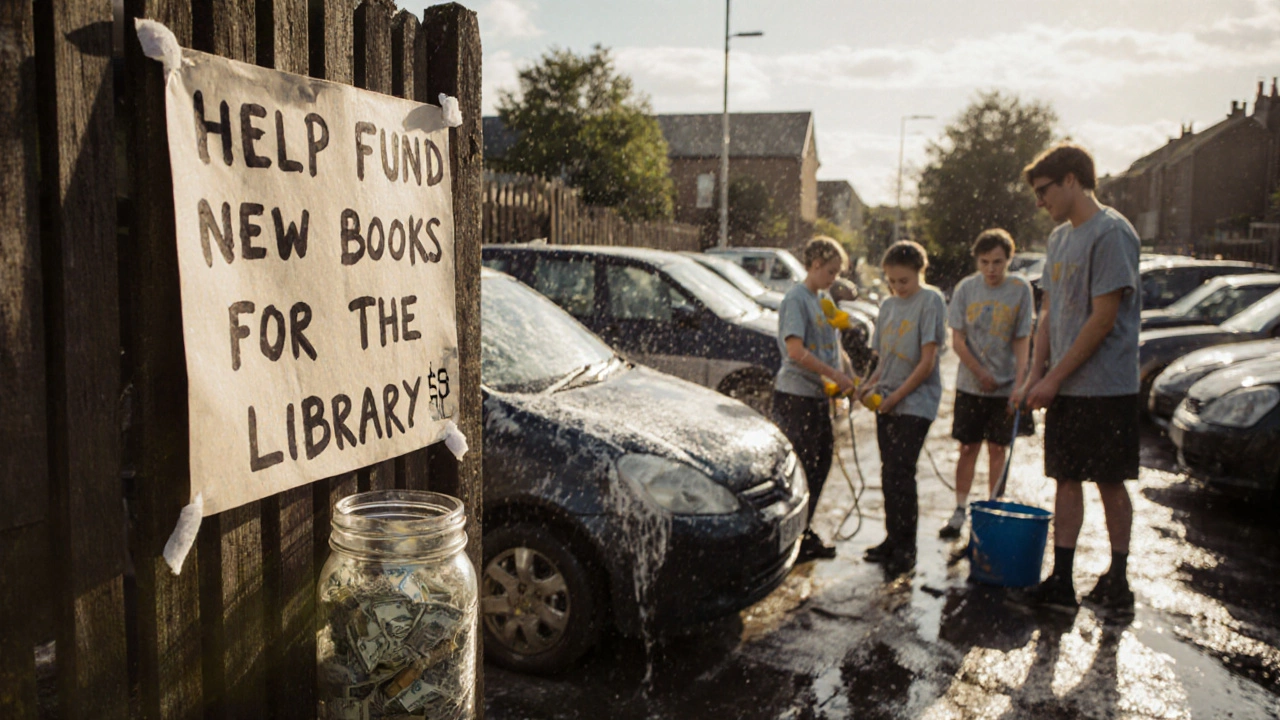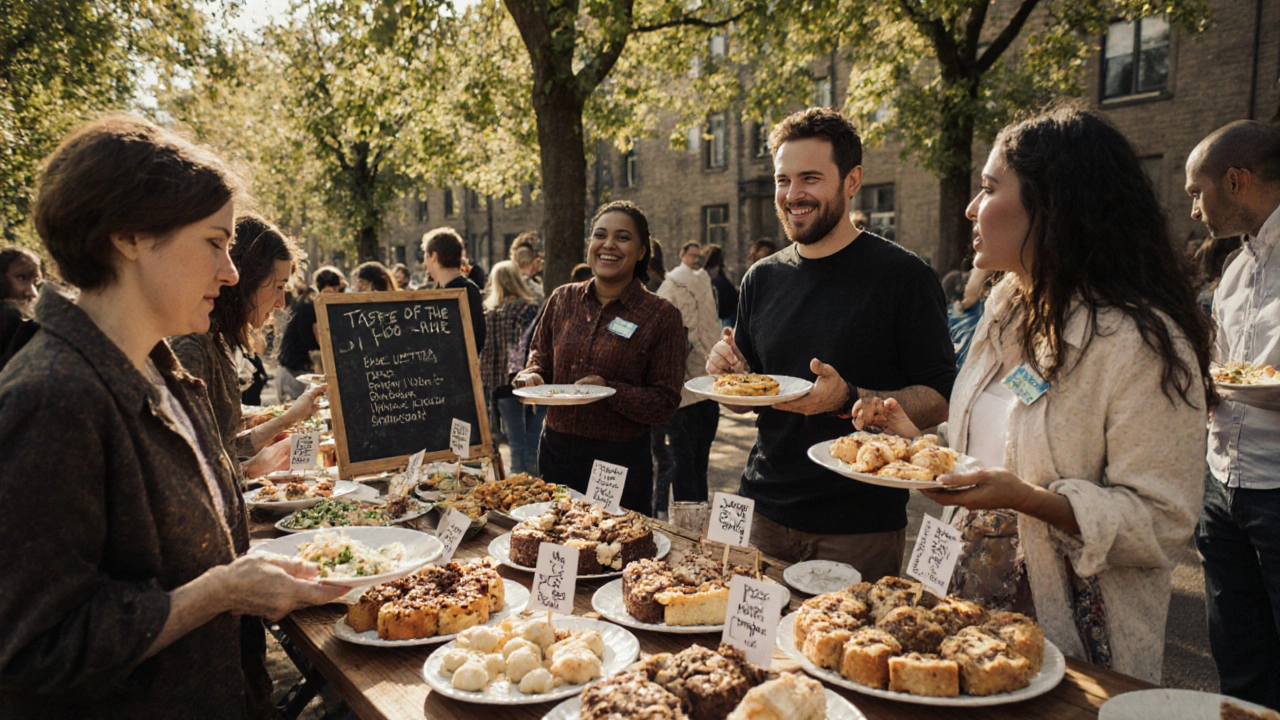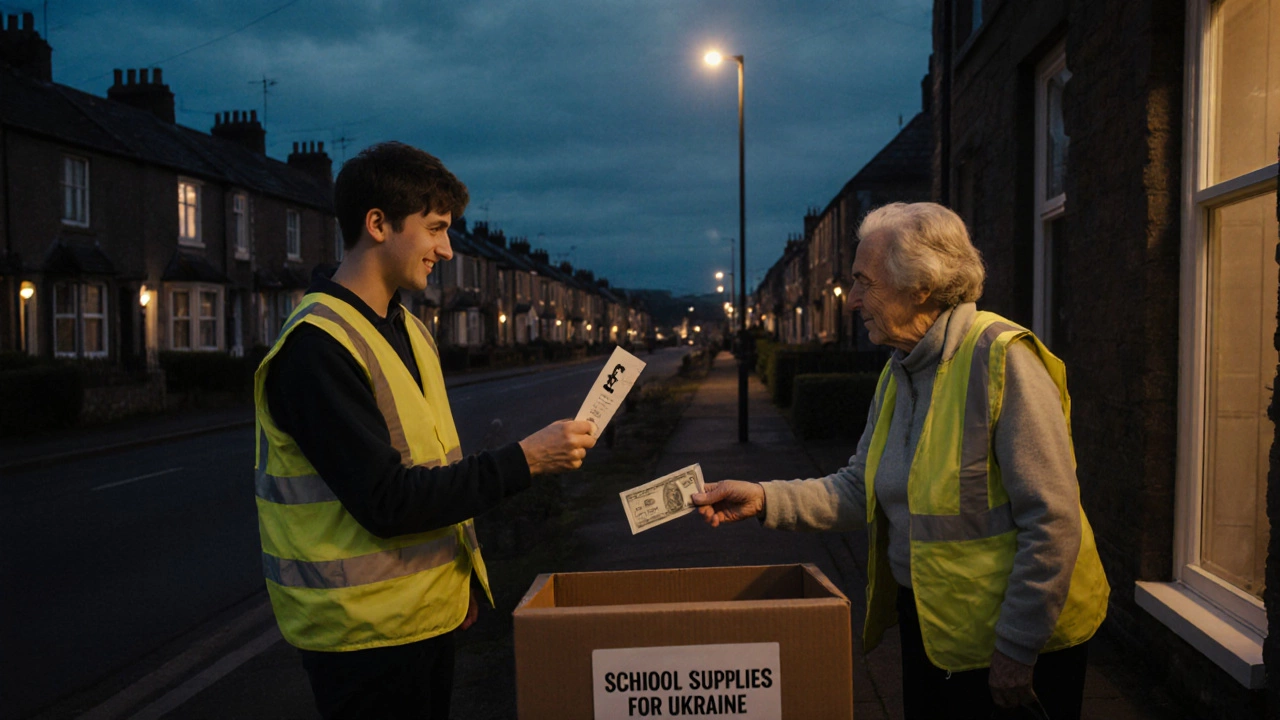What Is the Cheapest Fundraiser? Low-Cost Ideas That Actually Raise Money
 Nov, 23 2025
Nov, 23 2025
Fundraiser Profit Estimator
Your Fundraiser Details
Results
You want to raise money for a good cause, but you don’t have a big budget. Maybe your group has £50 to spend, or maybe you’re just starting out and need to prove you can get results before asking for more. The good news? The cheapest fundraisers often raise the most - not because they’re flashy, but because they’re simple, personal, and community-driven.
Car Washes Still Work - And They Cost Almost Nothing
Think car washes are outdated? They’re not. In 2024, a group of high school students in Glasgow raised £1,200 in one Saturday by washing 80 cars. Their total cost? £35. That’s soap, sponges, two buckets, and a few old towels they already had at home.
You don’t need a fancy setup. A driveway, a hose, and volunteers with old T-shirts are enough. Charge £5 per car. If you get 100 cars, that’s £500. Even if you only wash 30, you’re still ahead. Local businesses will often donate soap or water if you ask. One café in Edinburgh gave them free coffee for volunteers after seeing the sign: ‘Help us fund new books for the local library.’
bake Sale? Yes - But Make It Smart
A bake sale isn’t just cookies and brownies anymore. The trick is to turn it into an event, not just a table. In Leith, a community group raised £800 by hosting a ‘Taste of the Neighbourhood’ bake sale. Each baker brought something that represented their heritage - Polish pierogi, Jamaican rum cake, Scottish shortbread. They didn’t charge for entry. They charged £3 per item. People stayed, talked, bought more than one thing.
Cost? Flour, sugar, eggs. Maybe £10 total if you get people to bring ingredients. No oven rental. No permits needed if it’s on private property. The real win? Word spreads fast. Someone posts a photo on Facebook. Someone else says, ‘I’ll bring my famous scones next time.’ It grows.
5K Walk or Run - No Entry Fee, Just Donations
You don’t need a race permit to host a 5K. All you need is a route - a park, a quiet street, a loop around a school field. In Dumfries, a local dog rescue group hosted a ‘Paws for a Cause’ walk. People signed up online for free. Then they asked friends to sponsor them £1 per lap. One woman walked 12 laps. She raised £120. Ten people walked. They raised £800.
Cost? Printed maps (£5), a few balloons (£3), and a loudspeaker borrowed from the community centre. No insurance. No food stalls. Just people walking, talking, and giving.
Used Book Sale - Free Inventory, High Profit
People have shelves full of books they’ll never read again. Ask them to donate. One church in Aberdeen collected 1,200 books in two weeks. They sorted them into categories: fiction, kids, cookbooks, local history. They priced everything at £1 or £2. Sold out in three hours. Made £1,800.
Cost? Cardboard boxes, a couple of tables borrowed from the library, and a sign made on poster board. No website needed. No payment app. Cash only. Volunteers showed up because they wanted to clear their own shelves. The library even let them use the parking lot for free.

Game Night - Bring Your Own Snacks, Keep the Cash
Board games, trivia, charades, card games - people love them. Host a game night at your home, a community hall, or even a pub after hours. Charge £5 per person. That’s £150 if 30 people come. You don’t need prizes. The fun is the competition.
One group in Dundee raised £650 by hosting a ‘Dungeons & Dragons’ night. They didn’t even buy dice. People brought their own. They used a free printable map from the internet. The host made a playlist of ambient music. They sold homemade lemonade for £1 a cup. Net profit? £580.
Door-to-Door Canvassing - The Old School Way That Still Pays Off
It’s not glamorous. It’s not easy. But it works. In a quiet suburb of Edinburgh, a group of teens went door-to-door asking for £2 donations to help fund school supplies for kids in Ukraine. They didn’t ask for money to be spent on them. They asked for money to be spent on notebooks, pens, and warm coats.
They printed simple flyers. They wore bright vests. They didn’t stay long. One minute. One ask. One smile. They visited 120 homes. Got 78 donations. Average gift? £4. Total? £312. Cost? £10 for paper and pens.
It’s not about being pushy. It’s about being clear. ‘We’re not asking for a lot. Just enough to make a difference.’ People respond to that.
Why These Work When Others Fail
Big fundraisers - galas, auctions, sponsored skydives - cost thousands to run. You pay for venues, permits, insurance, marketing, staff. And you’re lucky if you break even.
The cheapest fundraisers skip all that. They use what’s already around: people’s time, their stuff, their neighbourhoods. They don’t rely on apps or websites. They rely on trust.
Here’s the pattern:
- No rented space - use homes, parks, libraries, schools.
- No paid staff - volunteers only.
- No fancy gear - borrow, reuse, repurpose.
- No big ads - word of mouth, Facebook groups, local noticeboards.
- No overhead - everything is under £50.
These aren’t just cheap. They’re smart. And they build community - which is what charity is really about.

What Not to Do
Don’t waste time on things that sound fun but cost more than they bring in.
- Don’t buy branded T-shirts. Printing 50 shirts costs £200. You’ll sell maybe 20. You’re out £100.
- Don’t rent a bounce house. £300 rental. You need a permit. You need insurance. You need staff. You might raise £400. But you’re stressed, tired, and broke.
- Don’t try to go viral. You can’t buy attention. But you can earn trust - one conversation at a time.
Start Small. Think Local. Keep It Simple.
The cheapest fundraiser isn’t the one with the lowest cost. It’s the one that turns your community’s resources into real money - without draining your energy or your wallet.
Look around. What do you have? A garden? A skill? A network? A spare table? Use it.
One group in Inverness raised £900 by selling homemade jam. They used fruit from their own trees. Jars were reused from last year’s pickles. Labels were handwritten. They sold at the farmers’ market on Sundays. No website. No ads. Just a sign that said: ‘Jam made with love. £3 a jar. Helps feed families this winter.’
That’s the real secret. People don’t give because you’re loud. They give because you’re real.
What’s the absolute cheapest fundraiser I can do this weekend?
Host a ‘Donate Your Stuff’ sale. Ask friends, neighbours, or coworkers to bring things they don’t need - books, toys, clothes, kitchen items. Set up a table in your driveway or a local park. Charge £1 per item. Use cash only. Total cost? Under £10 for signs and bags. You can easily raise £200-£500 in a single day.
Can I do a fundraiser without asking for money directly?
Yes. Try a ‘Skill Swap’ event. People offer free services - haircuts, guitar lessons, car repairs, gardening - and ask others to donate to your cause in exchange. One group in Glasgow raised £700 by letting people book free 30-minute piano lessons. Donations were voluntary. Most gave £10-£20. No one was pressured. People gave because they got something valuable in return.
Do I need a charity number to run a small fundraiser?
No. In the UK, you don’t need to be a registered charity to raise money for a cause. As long as you’re not claiming to be a charity and you’re clear about where the money’s going (e.g., ‘We’re raising money for the local food bank’), you’re fine. Just keep simple records. Don’t collect more than £5,000 in a year without checking local rules - but most small events stay well under that.
How do I get people to show up if I’m not advertising?
Start with your inner circle - family, friends, coworkers. Ask them to invite one person each. Then ask them to post a photo on social media with a simple caption: ‘Going to the bake sale this Saturday. £3 for a slice. Helping kids in need.’ That’s organic reach. People trust personal posts more than ads. If you get 10 people to do that, you’ve reached 100+ people without spending a penny.
What if I live in a small town with no foot traffic?
Then go door-to-door. Or host a ‘Neighbourhood Night’ - invite everyone on your street to bring a dish and a donation. Turn it into a potluck. Play music. Let kids draw on the pavement with chalk. People show up because they know you. They’ll give because they care. One group in rural Perthshire raised £1,100 this way - from just 42 households.
Is it better to do one big event or several small ones?
Several small ones. One big event takes months of planning and costs money. Four small events - a book sale, a bake sale, a game night, a car wash - take a few days each. You spread the effort. You test what works. You keep momentum. And you reach different groups of people. In the end, you’ll raise more and burn out less.
Next Steps: Pick One and Do It
You don’t need permission. You don’t need a budget. You just need to start.
Look at the list. Which one feels easiest? Which one fits your life? Car wash? Book sale? Game night? Pick one. Set a date. Tell three people. Do it.
The cheapest fundraiser isn’t about money. It’s about showing up. And that’s something no budget can buy.
